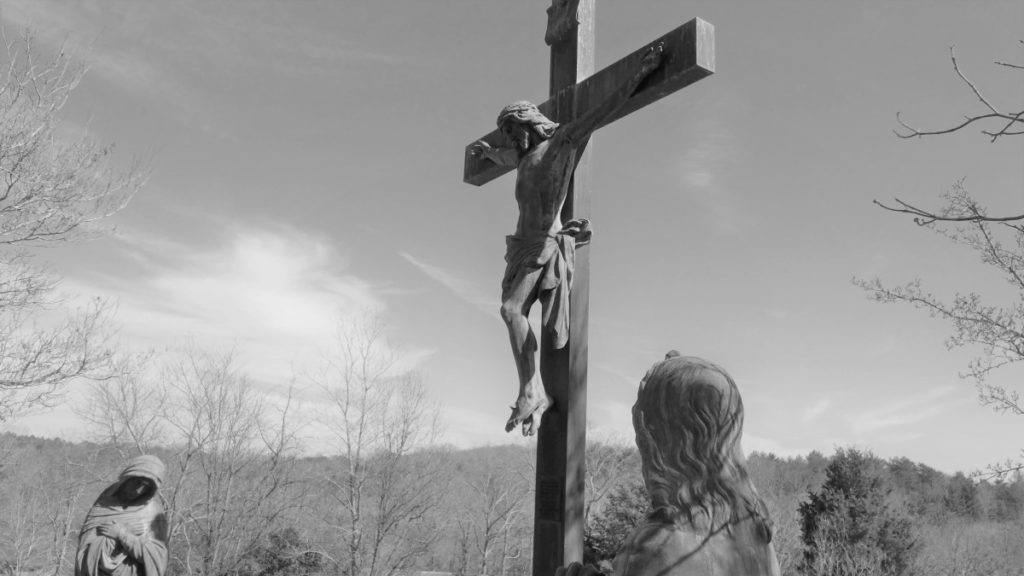Homily for the 3rd Sunday of Lent
by Deacon Scott Gilfillan

It seems like everyone I’ve met this week is going through some kind of trial. One is having problems with her child, another his finances, another his coworkers, another is having some emotional difficulties, several are concerned about their own health or the health of a loved one.
On top of that, gas prices are soaring, there are still food shortages and employee shortages, and now a war on the other side of the world – but one that feels real close. There is a lot of pain and suffering in the world, both up close and far away.
Like refugees, we come into this sanctuary to renew our faith in God, our trust in God’s providence. We come to experience God’s presence and hear God’s word.
The question today: What does God’s word say to people who are going through some sort of trial, or just exhausted by all of life’s challenges? The answer: There is hope even in the midst of suffering.
Saint Paul says to the Philippians, “Their minds are occupied with earthly things.” (Phil 3:21) Indeed. Our minds seem to be filled with earthly things. Who, however, is Saint Paul talking about? Who is the ‘they’ in ‘their’? It sounds like he might be talking about us. In the passage, however, he is talking about the enemies of the cross of Christ. Enemies of the cross of Christ – theirs are the minds “occupied with earthly things”. Why would he say this?
Enemies of the cross in Paul’s time were probably the Gnostics. Among other errant teachings, they believed that it was not by the suffering and death of Jesus that we are saved, but by His life and teaching.
The enemies of the cross of Christ deny that suffering is a part of salvation. They denied the value of Christ’s death on Calvary. They denied the profound reality that the only way suffering makes any sense is through the cross of Christ. Without uniting our suffering with the cross of Christ, our suffering makes us refugees without a home.
To soften the exhortation, Paul goes on to provide hope for the Philippians. He says, “But our citizenship is in heaven…” We are passing through this earthly life with all of its trials and tribulations. But in the end, we are not of this world. We are citizens of heaven. Our bodies are subject to death and decay now. Ultimately, “the Lord Jesus Christ… will change our lowly body to conform with his glorified body… Therefore, my brothers and sisters, [in the many trials you must endure] stand firm in the Lord.” (Phil 3:24)
In the account of the transfiguration of Jesus, we get a glimpse of this glorified body of Jesus. Jesus leads Peter, John, and James to the top of a mountain, and “his face changed in appearance and his clothing became dazzling white.”
The transfiguration of Jesus above all is a message of hope in the midst of suffering. The Church wisely places this account on the second Sunday of every Lent. Partly because by now, we’re probably feeling the effects of our own Lenten sacrifices. We might need a little encouragement. We might even be feeling the effects of the evil one trying to thwart our efforts to grow in holiness.
To fully appreciate how the transfiguration is a message of hope, we need to look at what happens immediately before Jesus leads the disciples up the mountain. Jesus first predicts his passion and death. He tells the disciples, “The Son of Man must suffer many things, be rejected by the elders…, and be killed.” (Lk 9:16) To the followers of Jesus, these words must have been horrifying. Suffering is so important to salvation that when Peter objected, Jesus said, “Get behind me Satan!” Suffering is part of God’s plan of salvation.
Then Jesus continues by telling the disciples what it will mean to them if they follow him. “If anyone wishes to come after me, that person must deny the self, take up one’s cross, and follow me.” He then escalated the cost of discipleship. “Whoever wishes to save one’s life will lose it, and whoever loses one’s life for my sake will save it.” In addition to horror at the thought of Jesus being crucified, the disciples must have been filled with fear, doubt, and insecurity at their own fate.
To give them hope and meaning to the suffering he and the others would soon experience, he provided this glimpse of the transfiguration into his glorified body. It is as if Jesus were saying, “Yes, you will indeed suffer. Yes, your life will be difficult at times. But you’re going to get through it. Look at the glory yet to be revealed.”
No matter what you’re going through today, unite your suffering to the cross of Christ. Lay your burden upon his shoulders. Remember that you are just passing through this world, but your true citizenship is in heaven. And one day, “the Lord Jesus Christ… will change your lowly body to conform with his glorified body…”
